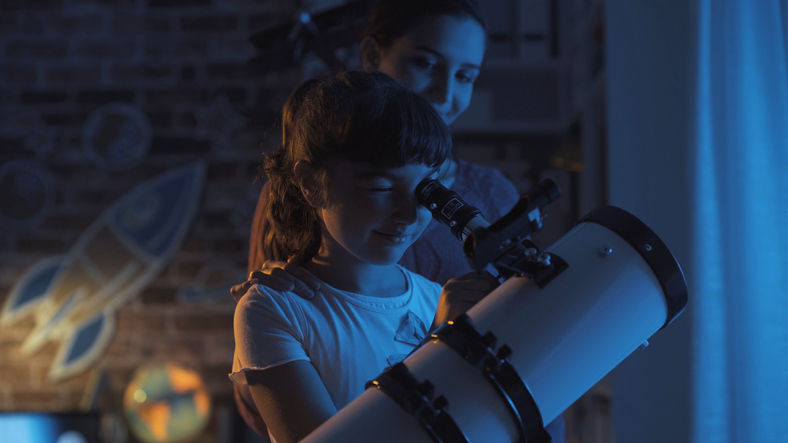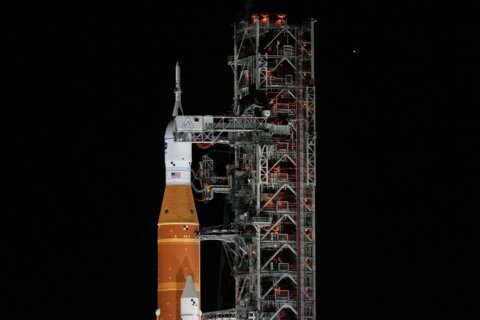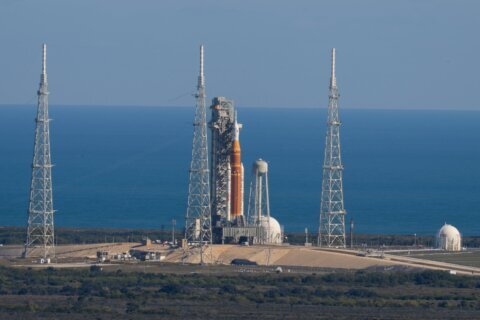Oh, Santa! It’s that time of the year to shop for your favorite stargazer.
WTOP’s annual gift guide for stargazers will help Santa provide goodies for those who spend time among the stars.
Monthly magazine subscription
An essential first step for someone new to astronomy (or even a seasoned stargazer that doesn’t have a subscription) is getting them a magazine subscription to either (or both) Sky and Telescope or Astronomy. Santa gets an added bonus when the magazine arrives each month as it will be a reminder of you to your special stargazer. S&T and Astronomy also provide a digital version as part of the magazine subscription which comes in handy for convenient computer access and reference.
Both monthly magazines with their respective websites are a wealth of observing advice, astronomical equipment, pictures, book reviews, astronomy related ads, related news and monthly observing guides/star charts. For full disclosure, I am a life long S&T subscriber, have done major feature articles for them and been a total solar eclipse cruise tour S&T staff member.
Astronomical calendar
These nifty gift ideas provide your stargazer essential astronomical information on a daily basis accompanied by a beautiful and informative astronomical image. These can be used at work or at home. You can find these at the online stores for Astronomy and Sky and Telescope.
A big tip for Santa: If you have a seasoned stargazer, consider getting the 2020 Observer’s Handbook. Santa gets me one each year and I use it every day. Oh, and at night too.
Books
There is a whole universe of astronomy and space related books available that Santa can check out and purchase. You can browse Amazon and Barnes and Noble for a title that is out of this world. If you know your stargazer’s interest, you can try and buy a book for them. A much better option is to buy them a gift card that they can use to buy a book of their choice. Browse these websites in advance to make sure your gift card has sufficient value to cover most of the books in the selection. This is a tried and true present for your stargazer.
An EXCELLENT book series you may want to check out is Springer Astronomy’s “The Patrick Moore Practical Astronomy Series” which has 166 titles that covers just about everything in the universe of amateur astronomy. Oh, and I have a book in the series with another one on the way next year.
Space rocks
You can’t give a more out of this world gift than an actual space rock — or actually, more likely than not, a piece of one. Meteorites come from the asteroid belt, the moon and even Mars. When the weather gets your stargazer down, cure their frustration by giving them a piece of the solar system to hold and contemplate. It really is pretty awesome to hold a 4.6 billion year old rock that came from space!
“Know thy dealer” are words to the wise who are shopping for space rocks. New England Meteoritical Services has what I consider to be the best and most reasonably priced presentation sets for purchase which you can see when you scroll down their web page. I have personally dealt with them and I highly recommend them.
Movies
If you want a sock stuffer, consider buying space-themed movies and educational series. The “Star Trek” movies (old and new, Kirk and Picard), “Gravity,” “Europa Report,” “Cosmos” (the original with Carl Sagan, and the revival with Neil deGrasse Tyson), “The Martian,” “Interstellar,” “Apollo 11,” “Hidden Figures” and any of the National Geographic, Science Channel, Discovery Channel, History Channel space-themed segments are excellent.
Binoculars
If you have a budding stargazer that wants to see more of the sky than what their eyes alone can provide, quality binoculars are a great gift. A whole new view of the sky is theirs and as an added bonus, binoculars can be used for bird watching and sporting events.
A quality pair of binoculars will show impressive detail on the moon, a few galaxies, star clusters and nebulae if you know where to look. This is where those magazine subscriptions and books come in handy. The four main moons of Jupiter will be visible if you hold your binoculars steady enough. Stars and their colors will be more vibrant in appearance in binoculars and are very pretty to look at.
“7×50” binoculars — the 7 is the magnification while the 50 is the size of each objective lens in millimeters — are recommended. This is a good compromise between magnification, light gathering ability and field of view. Less magnification means less detail, but a wider field of view while more magnification reduces field of view while giving more detail. I would not go higher than 8 in magnification or lower than 50 in objective size for a beginner. There are large astro-binoculars out there, but they are for advanced users.
You can buy binoculars at sporting goods stores and all of the major chains like Costco, Walmart and Amazon. A good online store that I have used for many years is Orion Telescopes. They have an excellent binocular (and all things astronomical) assortment, stand by their products and great customer service. They also have extensive descriptions and background information on types of binoculars and how to choose a pair.
A telescope
This is the ultimate and most risky gift idea on Santa’s list. There is nothing quite like getting that first telescope and experiencing “first light” — the first view of the sky through it. This is a risky gift idea because telescopes are an investment in terms of money with possible pitfalls due to a poor selection. There is nothing worse than buying a telescope that never gets used because it is too complicated, too heavy or too poor in quality. If that happens, they just collect dust from never being used.
With the right purchase, there is no reason why a quality telescope will not last a person’s entire lifetime, or at least a good portion of it. Many nights of enjoyment and discovery at the eyepiece of a good telescope are pure joy to your stargazer. If this is a family member or significant other you can do your telescope observing together.
There are many telescopes out there and for Santa to pick just the right one for your stargazer, unless you have “insider information,” is highly unlikely. If your astronomer has spent time studying telescopes and has selected one, great. BUT before you buy, make sure your telescope dealer has a return policy that allows you to get your money back if things don’t work out or there are issues with the telescope.
You and your stargazer need to be aware of things that can go wrong in selecting that first telescope which will lead to disappointment and disuse.
Santa says your best bet is to test drive telescopes by looking through them before you buy — you will be glad you did. Another tip is to always buy a quality instrument that will last a lifetime and deliver best performance.
Get that telescope test drive by going to a local astronomy club and attend one of their star parties — almost all astronomy clubs do this. Star parties are where club members gather at a favorable night sky viewing site with their telescopes to observe and share the views with the public.
This provides an opportunity to see up close and personal different types of telescopes and look through them at a wide variety of astronomical objects. This helps immensely in the selection of a telescope. We have some great resources here in the DMV to do just this — refer to the Astronomical League list for your area. You could also give your stargazer a membership to the astronomy club of their choosing.
Here are online sources to look over to help you in your telescope selection: Sky & Telescope, Astronomy and Telescope.com.
Santa’s recommendation for first telescopes is this: Put together a gift package or card that says after a selection process has determined the best telescope to buy, you will bankroll the purchase of a new telescope. Santa also recommends setting a price limit, as telescopes can cost thousands.
With Cyber Monday upon us, you can now launch your cosmic search for your stargazer.
Here’s to clear skies for the holidays.
Please Tweet or email if you have any questions:
Follow my Twitter feed (@skyguyinva) and daily blog to keep up with the latest news in astronomy and space exploration. You can email me at skyguyinva@gmail.com.








